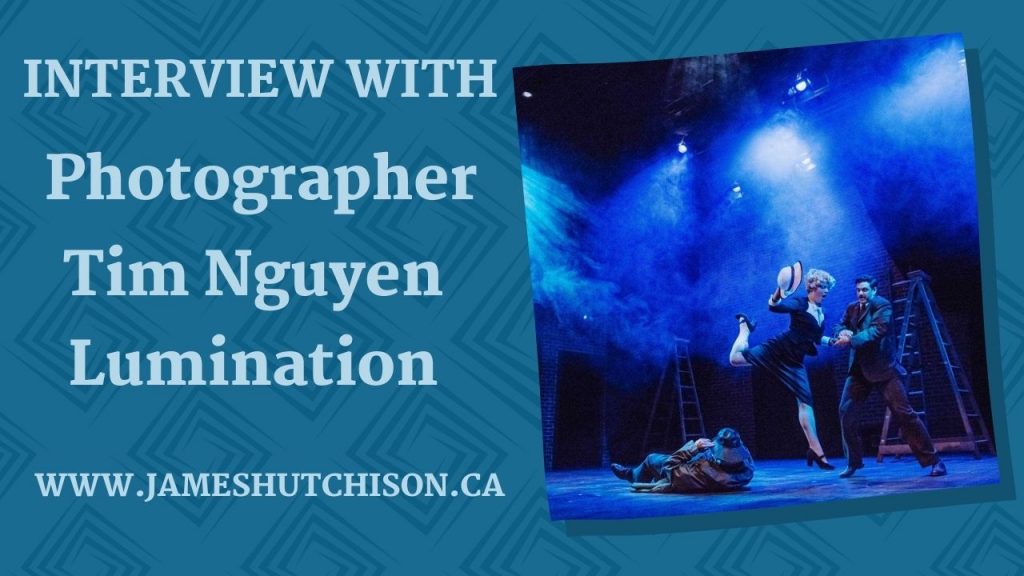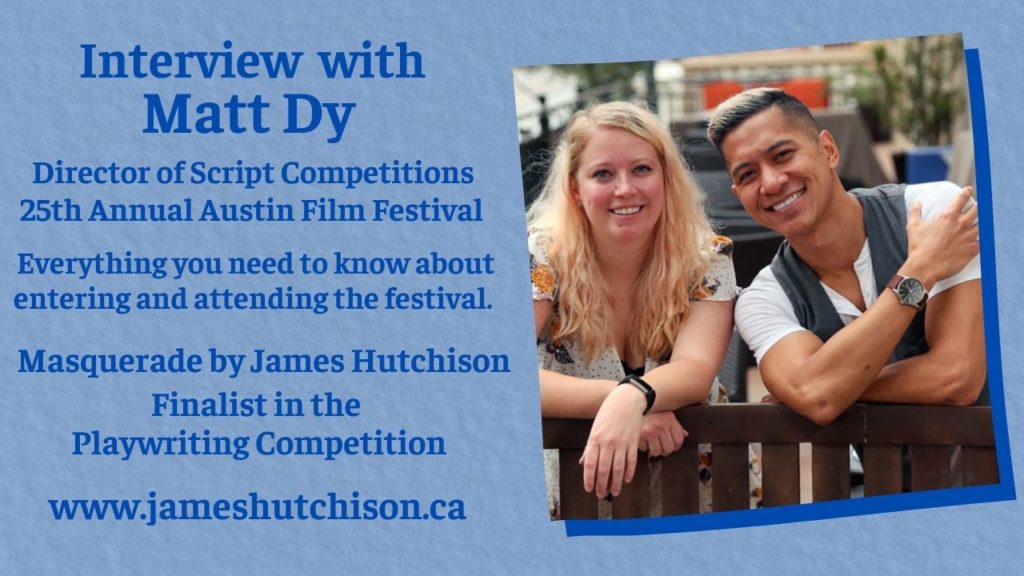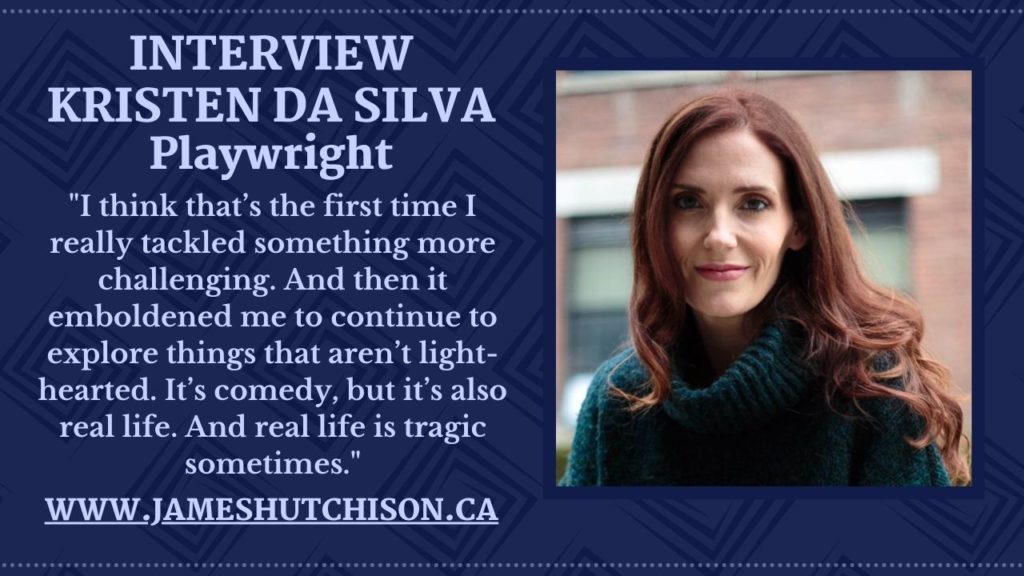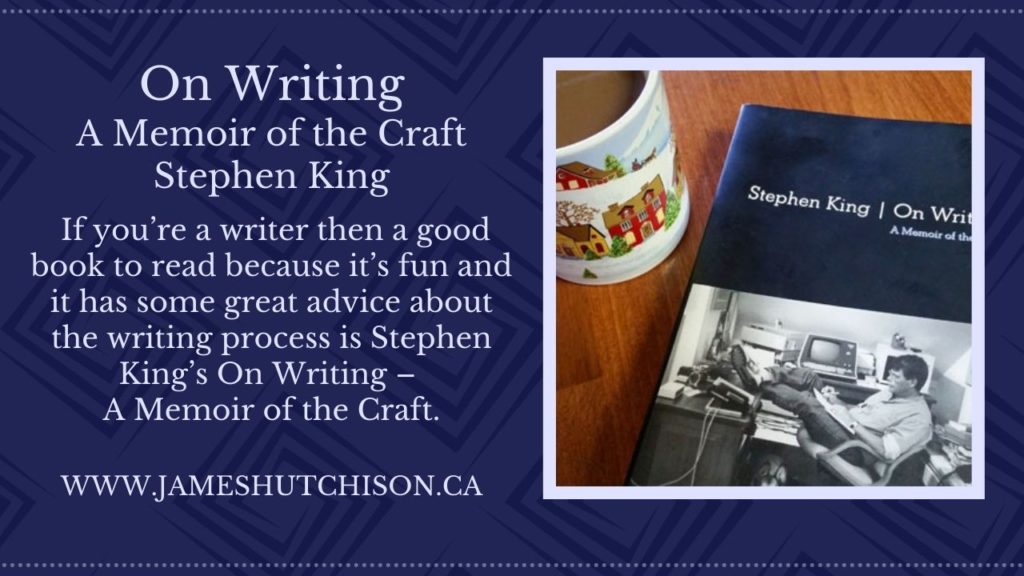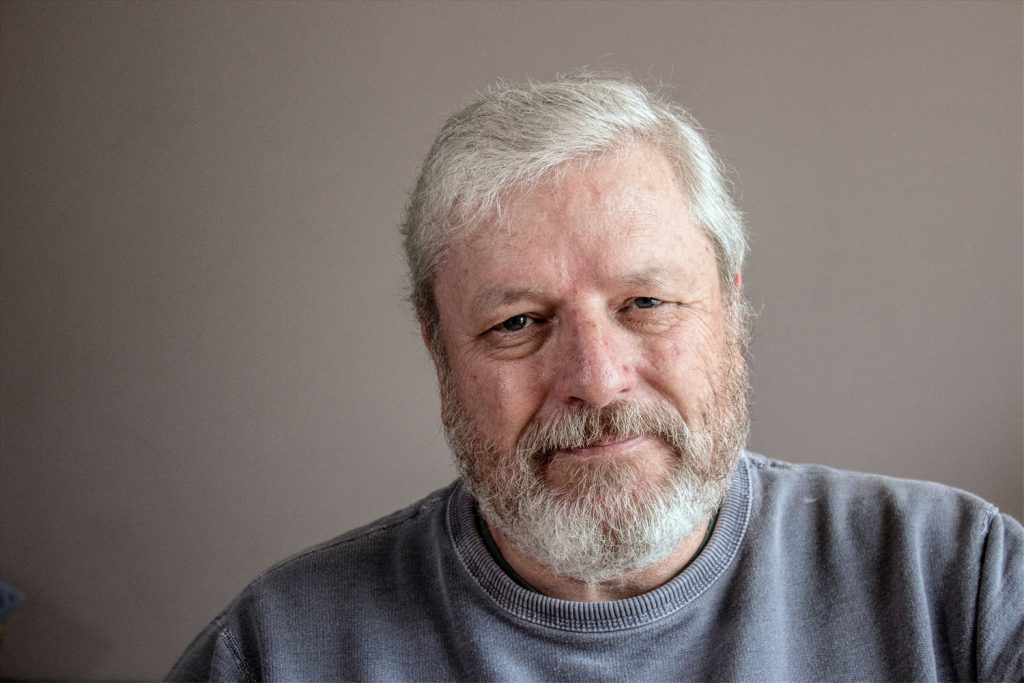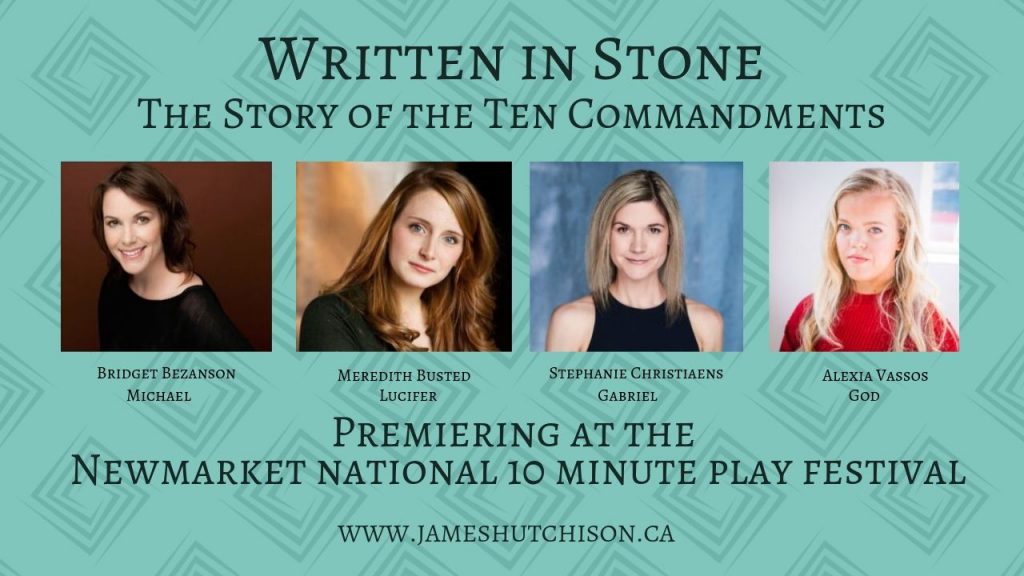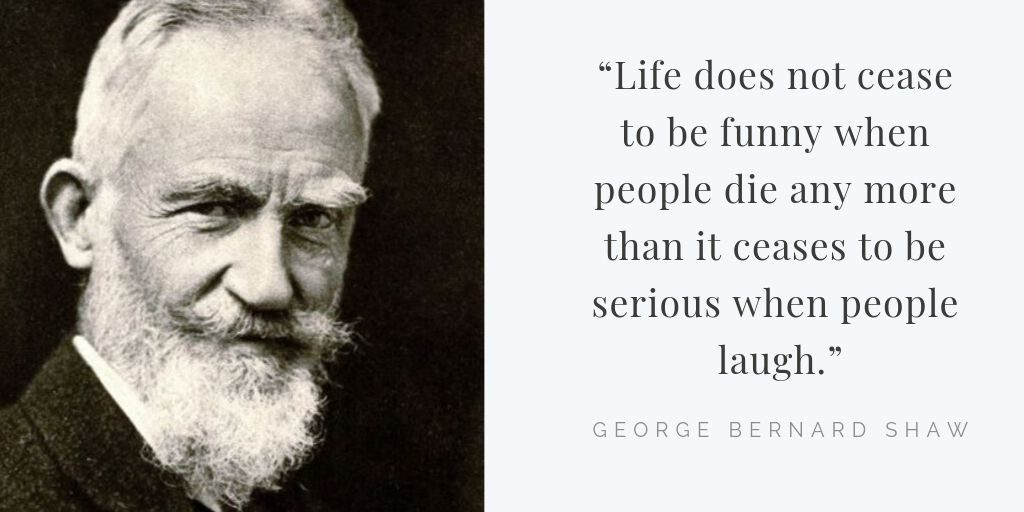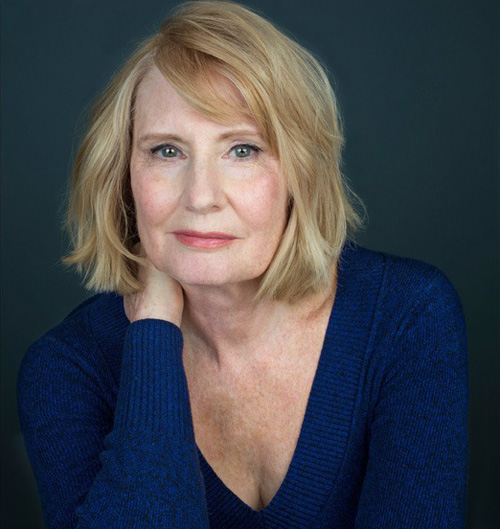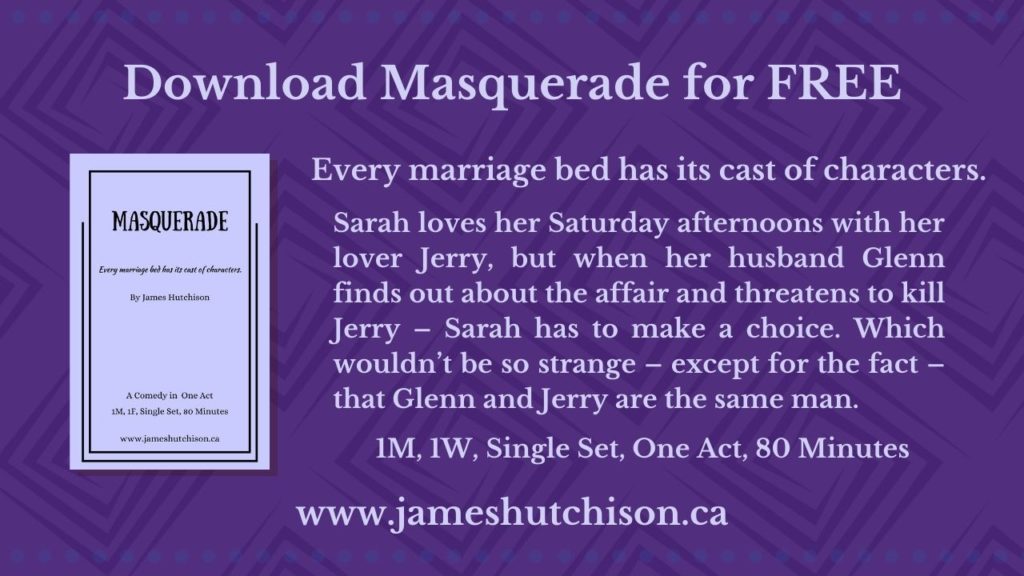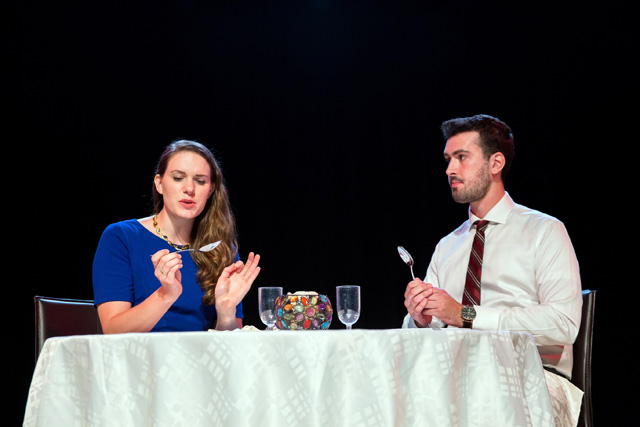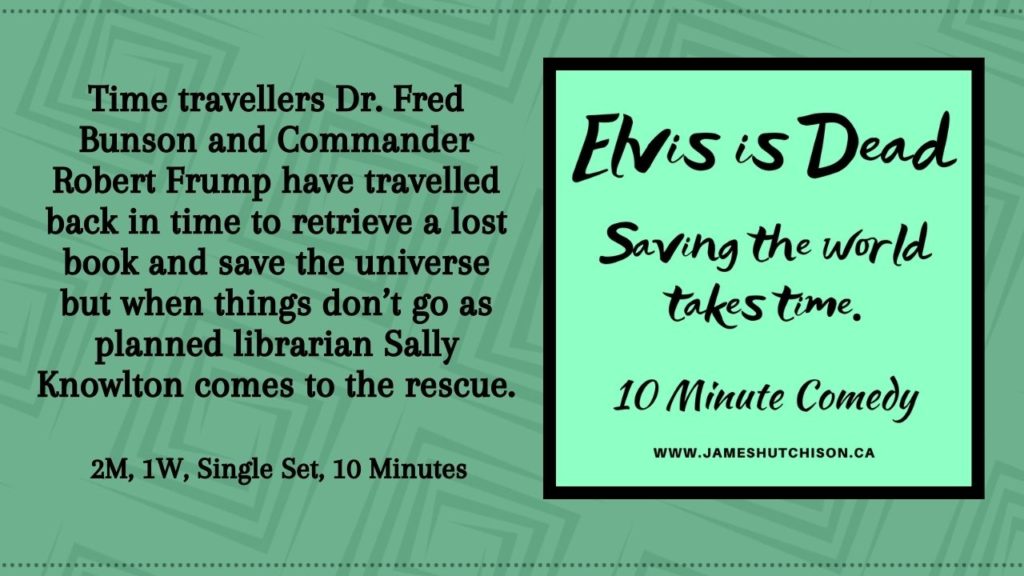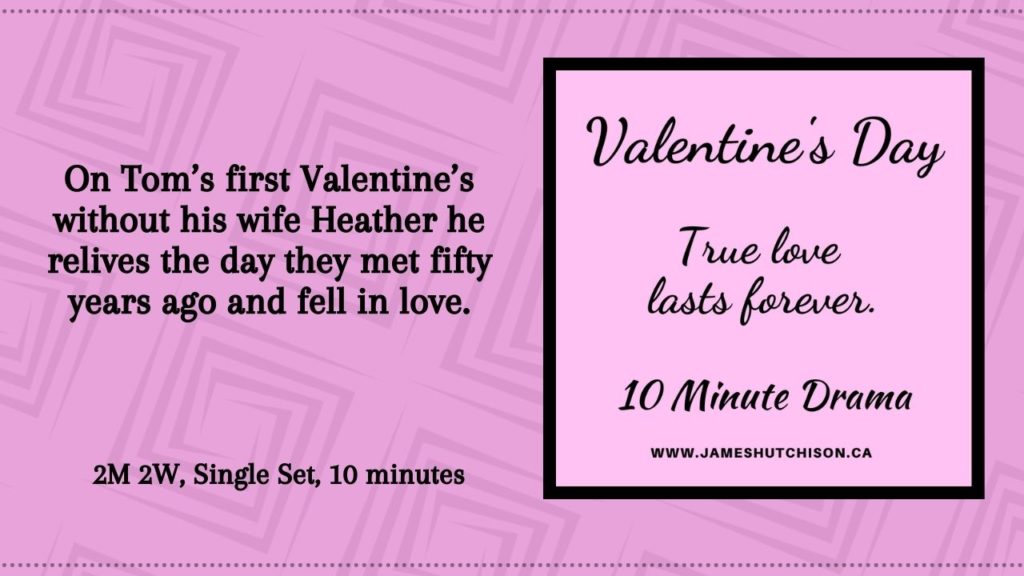
Trevor Rueger – Photograph by Hannah Kerbes
“When you sit down as a playwright and you start to think about a character that’s going to inhabit your world, that’s a piece of coal. Until you put that piece of coal under pressure, you’re not going to reveal all of its facets. So, characters have to be put under pressure. And that’s where you as a writer, and your audience is going to discover all of the facets of that character. And you’re going to turn that piece of coal into a diamond. With facets that shine and shape and inform. It’s pressure. But the pressure can be lost if the writer gives it too much time.”
Trevor Rueger has been an actor, director, writer and dramaturge for over 30 years. In 2011 he received the Betty Mitchell Award for Outstanding Performance by an Actor in a Supporting Role for his performance as Billy Bibbit in Theatre Calgary/Manitoba Theatre Centre’s production of One Flew Over the Cuckoo’s Nest. As an actor, he’s been seen at Theatre Calgary, Lunchbox Theatre, Sage Theatre, Vertigo Theatre, Stage West, and the Garry Theatre.
His directing credits include When Girls Collide, Columbo: Prescription Murder and Columbo Takes the Rap for Vertigo Theatre, Ai Yah! Sweet and Sour Secrets, Life After Hockey and The Complete Works of William Shakespeare (Abridged) for Lunchbox Theatre, Heroes for Sage Theatre, SHE and Matadora for Trepan Theatre, Medea and 33 Swoons for Rocky Mountain College and Courage for Lost Boy Productions
For 20 years he was an ensemble member and writer for Shadow Productions. Trevor was also an original ensemble member of Dirty Laundry which is a weekly improvised soap opera and for 10 years he was chair, writer, and producer of the Betty Mitchell Awards which recognizes excellence in Calgary Theatre.
I’ve worked with Trevor several times over the last decade as a dramaturge and I’ve always found his feedback on my plays to be insightful and constructive. He asks the right questions. Questions that make me think about my story and characters in a manner that results in a better draft.
I sat down with Trevor at Alberta Playwrights Network where he’s been the executive director for the past eleven years to talk with him about his career and his approach to acting, directing, and working with playwrights. Our interview took place in late January, a few months before the current pandemic and lockdown, and so the impacts of COVID-19 on the Canadian Theatre Community were not a part of our conversation.
JAMES HUTCHISON
I’m curious, how did you get interested in theatre and what were some of those early experiences and influences?
TREVOR RUEGER
I didn’t get involved in theatre until high school. I come from a family that was certainly not against the arts. We as kids were just allowed to find our own way. So, when I was a kid, for me, it was sports for the most part.
I was a middle child with six years difference between me and my younger sibling out on an acreage where the nearest neighbour, who was five years older than me, was two miles away. So, I spent a lot of time by myself inventing games and inventing sports and I was quite imaginative and creative, and I was a bit of a gregarious kid as my mother would state.
So, in high school, my mom said, “Well, you should probably take a drama class because you’re such a ham.” And I said, “Okay.” So, I did.
And on the first day of the drama class, it was announced that auditions for the school play were happening that afternoon, and so I signed up for an audition. The play was called Present Tense and it’s a fun little play about a kid in the 50s who’s having trouble with his girlfriend and he imagines that his girlfriend is having all of these wild and crazy love affairs with everyone but him. So, I auditioned for the play and the next day I was cast as the lead in the show.
JAMES
Had you not been cast, who knows?
TREVOR
Oh, exactly. Absolutely. And so, I took drama and played sports all the way through high school. And there was a bit of a pull between my basketball coach and my drama teacher as to which I should focus on. And when I was in grade 12, there were some conflicts between my basketball schedule and my drama schedule and suddenly my schedule all worked out, because unbeknownst to me until I found out many years later, my basketball coach and my drama teacher had gone behind my back and negotiated my schedule.
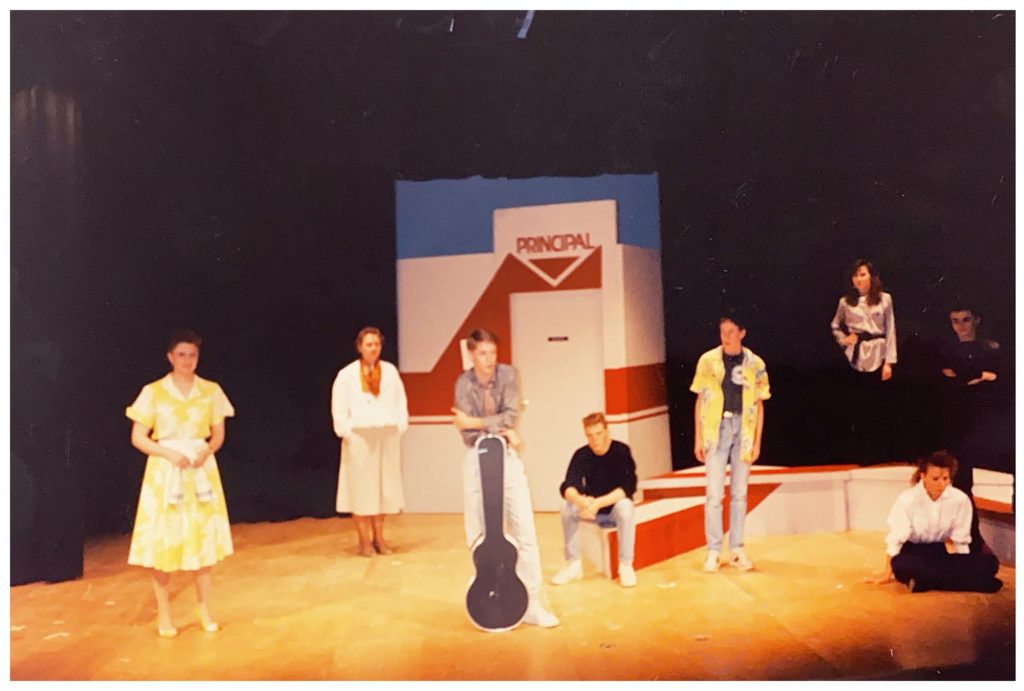
High School Years
JAMES
Oh, that’s cool. So, then you went off to the University of Calgary to pursue a degree?
TREVOR
I didn’t start out pursuing a degree in theatre. I did one year of General Studies and then I was going to go off into the Education Department where I was going to become a math teacher. But I took drama 200, which was the introductory acting class with Grant Reddick. Halfway through the course you get your grade, and you have a little meeting with the instructor.
So, I go into Grant’s office and sit down and Grant says, “The work is really coming along and you’re really doing well and here’s your grade. How are you doing in your other drama courses?” And I said, “I’m not taking any other drama courses, I’m actually, in General Studies and going into the Education Department.” He went, “Oh, no.” And I said, “What do you mean?” He went, “You should probably take the other drama classes.” And I went, “Okay.”
So, I went home and had a challenging conversation with the parents about switching my major and going into the drama department.
JAMES
How did you approach that? I mean, you said they were pretty open but a number of years ago there was more of a thought that you picked a career and stuck with it. You didn’t have options. Now days people will have four or five careers.
TREVOR
That was certainly their major concern. This does not seem like a career choice. This does not seem like something you can make a living at. This sounds like something, that while it may satisfy you in one way, is going to be incredibly challenging. And so, they’re really looking out for me, right?
JAMES
As parents do.
TREVOR
Yeah, absolutely. It was a difficult conversation. It was three or four years later that I finally realized they were acting out of love and protection and wanted the best for me. But I kind of had them over a barrel because they had made a promise to all of their kids that if you went to university or college they would pay for it. So, I threw the gauntlet down and said, “That’s fine. I am out of here and you’re really reneging on your promise.” So, there was some negotiation and my dad kept pushing me to do a fallback degree afterward. But oddly enough, all the way through my university I was working professionally as an actor. I was studying during the day and doing shows at night.
JAMES
What kind of shows?
TREVOR
I got my first paycheck from Stephen Hair for doing a straight play called Cards on the Table by Agatha Christie at Pleiades Theatre back in that time. I think I played a police officer who had six lines.
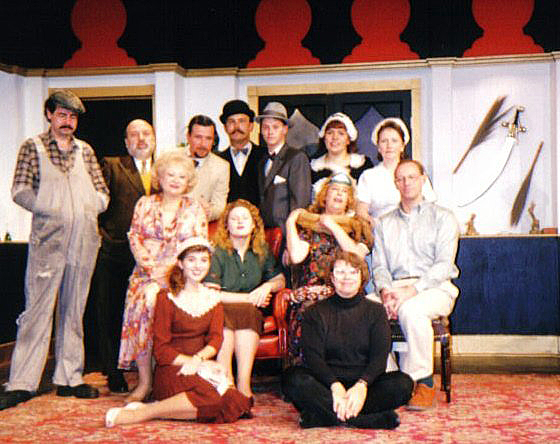
Pleiades Mystery Theatre – Cards on the Table by Agatha Christie
JAMES
So, you’re in university and right away you get taken in by the Calgary theatre community. How do you think that helped you build your career here in the city?
TREVOR
I have to take a step back slightly because I already knew a lot about the Calgary theatre community before university because my high school drama teacher Kathryn Kerbes was a professional actor and did some shows while she was a teacher. And her husband Hal Kerbes was quite well connected and a fantastic artist and actor, singer, and costumer. He did it all. In fact, our high school drama class was thrown a party by Hal and Kathryn Kerbes at their home after we graduated where they invited all of their theatre friends over. And so, at that point, I was already quite well immersed and I already knew a few of the people who were part of the cast of my first Pleiades show.
JAMES
So, how do you approach a character? How do you get into the mind of the person you’re going to be? The character you’ll be portraying.
TREVOR
I start big. I start with a big wide canvas. And then I bring the lens into smaller and smaller and smaller details. The first thing I look at is the narrative journey and arc of the character. And then figuring out within that arc what the character wants. That to me is the fundamental question approaching any material. What does the character want? Then once I discovered that I ask how does the character fit into the story? Then I start to look at the text. What does my character say? What does my character say about myself? What do other characters say about my character?
And then I start to develop a physical vocabulary that comes from the world around me and the world that we’re creating in the rehearsal hall and then ultimately on stage. If I’m in a family drama one of my tricks is to look at my relatives and steal their moves. I’ll decide within the family structure who is the most influential on my character, and then I’ll pick up their mannerisms.
So, for instance, I was playing Happy in a production of Death of a Salesman at the Garry Theatre directed by Sharon Pollock. And I just watched the physical mannerisms of the actor who was playing Willie, and the actor playing my older brother Biff and it wasn’t mimicry, but I just went, with a similar physical vocabulary.
JAMES
Any particularly fond memories of a role that you really enjoyed working through and capturing,
TREVOR
I’ve enjoyed a lot of the work I’ve done but the work I did as a young actor with Sharon Pollock at the Garry Theatre was really great stuff to be able to cut my teeth on. The Garry Theatre was a pretty amazing experience because I was directed by her in roles that I would never have had an opportunity to even audition for at other theatres in Calgary or across the country. I played Alan Strang in Equus, I played Happy in Death of a Salesman and I played two or three characters in a production of St. Joan. But I was so green. I was absorbing the work without actually being able to articulate what I was doing.
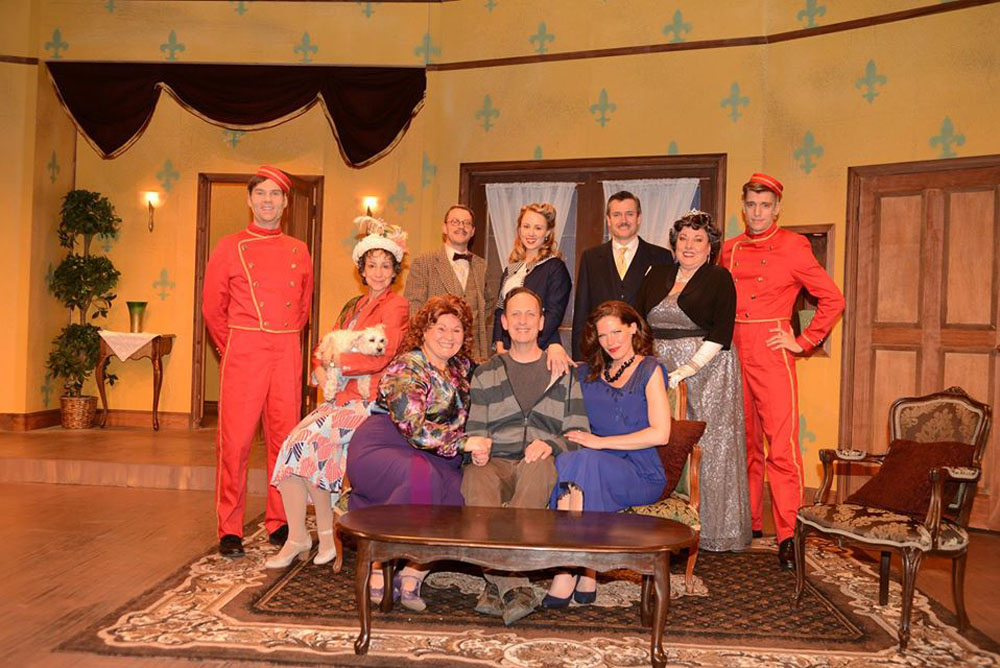
Cast from the 2016 Stage West Calgary Production of Suite Surrender by Michael McKeever
JAMES
What was it like for your family to come and see you on stage?
TREVOR
They were always supportive, and they came to see as much of the stuff that I was in as they could. And my dad was quite gregarious as well and spent a fair amount of time telling stories in various pubs in and around Forest Lawn, and I would go and meet him every once in a while in the afternoon for a beer after class. And going through university my dad was always, “ You know you could get your education degree.” And in year two it was, “You could get a real estate license.” Year three it was, “You know, you could probably turn these drama skills into sales. I know a guy who owns a car dealership. You could sell cars on weekends. Or you could always learn to be a backhoe operator.” So, he was always just going, “Get something else to fall back on. It doesn’t have to be another four-year degree.” And my dad would introduce me when friends would come over to the table as this is my son he’s going to university. Well, finally there was that day my dad introduced me to one of his pals who’d never met me before as, “My son. He’s an actor.” I went alright.
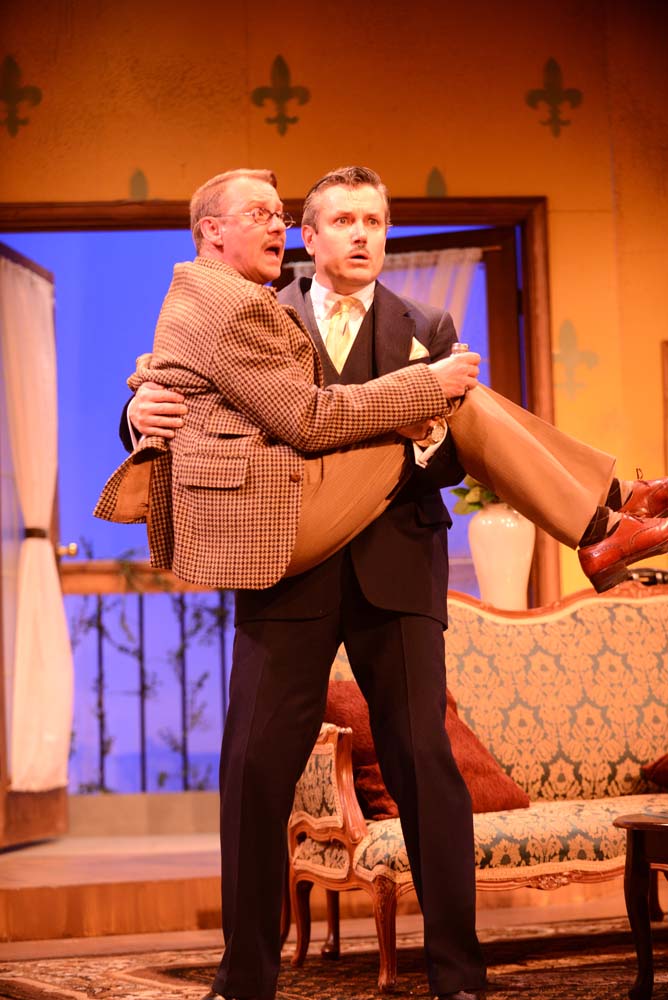
JAMES
So, tell me about what attracts you to directing and what type of shows are you attracted to?
TREVOR
Here’s the thing that I discovered which leads me very well into the world of being a dramaturge. It’s not that I dislike the performance aspect of being an actor. I quite enjoy it. I love putting on the costume. I love walking out in front of an audience. I love hearing them react and knowing that you’ve had an effect on them in some way. But when you get into the run of a show, it’s the law of diminishing returns. So, what I discovered when I started directing, which has led me into dramaturgy, is I love making big discoveries. And that’s the rehearsal hall. It’s the same way as I was just discussing how I approach a character right. Starting with this big broad canvas. So those big discoveries. What is this world that we’re going to create? Who are the people who inhabit this world? How do they connect to each other? What are we telling an audience? What are we showing? What are they seeing? All tied back to, we’re supporting the work of the playwright.
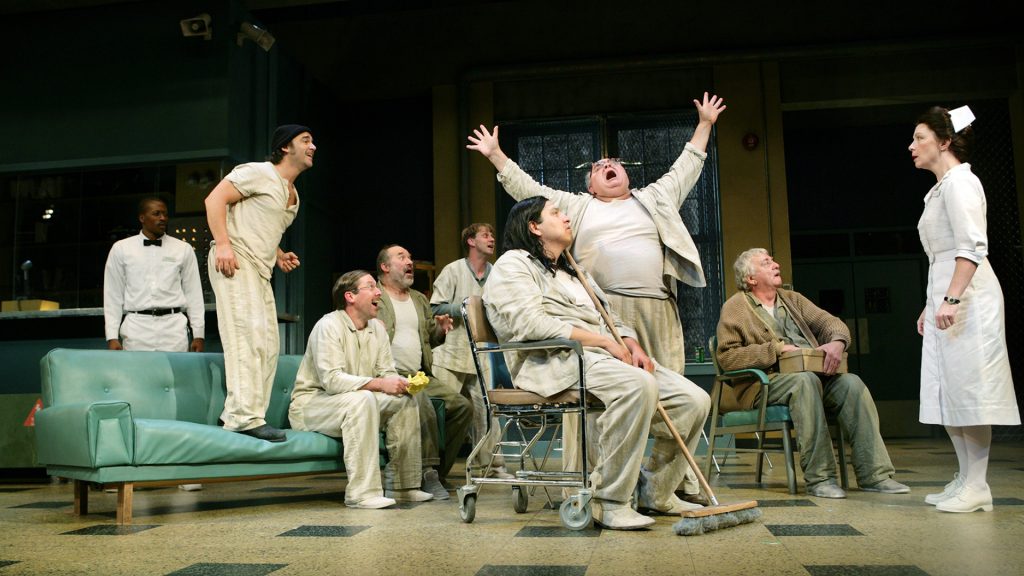
The 2010 Theatre Calgary Production of One Flew Over the Cuckoo’s Nest by Dale Wasserman. Based on the novel by Ken Kesey. Directed by Miles Potter.
JAMES
How did you end up getting involved in dramaturgy?
TREVOR
It was working with Sharon Pollock. It really was. It changed the notion of how I look at work and how I look at plays. And at that point, I had no idea what dramaturgy was, but she looks at work as a director, as a writer, as an actor, and with such a writer’s eye, and with such dramaturgical care for the work that it made me read differently.
Again, we were doing Death of a Salesman and in our first read through the actor, playing Willy Loman made a choice with a line delivery on about page eight or nine. And it was our first read-through and Sharon stopped there and went, “That’s a very interesting choice that you’re making. I just want to warn you, let’s not get trapped into that yet because while you do say that and that could be the emotional content of what you’re saying here – forty pages from now you say this.” And I thought – how is she on page eight, and on page forty at the same time, and it was because she had a concept or saw the whole. And it made me start to look at work differently. As an actor to look at work differently. As a director. And then realizing a few years later, oh, that’s dramaturgy. That’s dramaturgy – defending the work of the playwright and seeing the big idea within that world.
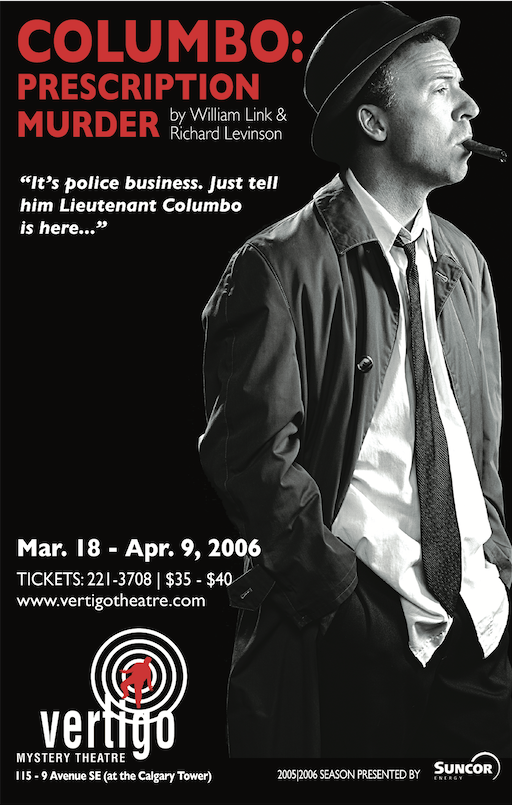
JAMES
I find it takes a couple of reads to understand the connection between page eight and page forty because on a first read you don’t always see the connection between the two.
TREVOR
Absolutely. Though, as a dramaturg it’s not that I don’t give work multiple readings before actually crafting a response to a playwright but I generally make my notes on the first reading because for me – what the playwright has asked me to do as the dramaturge is to be their very first audience. And an audience is only going to see a work once. So, I approach it with that mindset. So, I will read it and make my big notes and observations. Then usually upon a second or third reading, I start to be able to see, “Oh, hang on, my bad. I misread that. Oh, I see, that connects to that.” Or, “Mmmm, it seems to be that the idea is shifting or has shifted or wants to shift.”
JAMES
This is why I think it’s very important not to share the work too soon. Because if you share it too soon you can never get that first reader back. Although to help make it fresh again one of the things I find useful is to put the work back into the drawer for six months.
TREVOR
Absolutely. So much of my practice, as a director has touched on that kind of notion. I feel that within the Canadian theatre system, we do not have enough time to rehearse nor do we have enough time to let the work germinate for the artists because of the commercial aspect of things, right, that you have to create a new product virtually monthly or bimonthly. Rehearsal periods are truncated and the work just gets rushed to the stage. So, for me as a director wherever possible I do five-hour days with my cast instead of an eight-hour rehearsal day. We’ll do eight hours for the first couple of days and then we’ll shift as soon as possible to a five-hour day.
JAMES
What do you find the shorter hours do for them?
TREVOR
They come back the next day fresh. They’re still working eight hours. They’re not doing eleven and twelve-hour days. So, they’re actually doing eight hours of work but you only have access to them for five. And that creates within the rehearsal hall a demand to be focused. People come in fresh and you can usually start those final days of rehearsal at noon. So it’s like 12 to 5. So, you come in fresh because you’ve had a morning. You’ve had an evening. You’ve had an opportunity to do some work. You’ve had an opportunity to think about the work. You’ve had an opportunity to reflect on notes. As opposed to coming home at the end of an eight hour day throwing some food in your face, trying to learn your lines, getting up the next morning and taking a look at the work you’re going to be doing the next day. It’s all so exhausting. It’s also exhausting for a director and a stage manager.

Jamie Matchullis as Jennifer, Chantelle Han as Lilly, Ben Wong as Charlie, and Kelsey Verzotti as Jade in the Lunchbox Theatre production of Ai Yah! Sweet and Sour Secrets by Dale Lee Kwong. Directed by Trevor Rueger – Photograph by Benjamin Laird
JAMES
So, tell me about APN.
TREVOR
The Alberta Playwrights Network is a membership-driven organization devoted to supporting, developing, and nurturing the work and the playwright through education, advocacy, outreach, and any other resource or technology that we can provide our membership.
JAMES
You’ve been running APN for eleven years. Where do you think you were as an organization when you started and where do you think you are now?
TREVOR
APN, as I’ve always known it, was a healthy, vibrant, energized organization. And the organization that I inherited, certainly was that. Strong membership base. Pretty interesting programming that people were taking advantage of. But over the last eleven years, the biggest thing that I’ve seen shift and change and alter is the theatrical landscape.
When I came into the organization Canada Council had just paid for a research paper to be written by Ben Henderson who was with Saskatchewan Playwrights Centre and Martin Kinch who was with Playwrights Theatre Center in Vancouver. Both organizations very much like APN. They wrote a paper called From Creation to Production that talked about the new play development model, as it existed in Canada, and as it existed in the UK and in some parts of the United States. And at that time, it was a pretty standard that a play gets selected for a workshop. A play gets developed. A play gets produced. Or a playwright gets developed and produced.
There were a lot of ideas in there that I looked at and I read. “Okay, is APN doing this? Yeah, we seem to be doing that. All right. That seems to be successful. We seem to be doing this. That seems okay. We don’t seem to be doing this. I don’t know if our organization could ever do this.”
So, I enacted a five-year plan at that point which focused on playwright advocacy and doing more work and providing greater agency for our members by getting their plays into the hands of people that might produce them. So, through that came a number of things including the catalogue which featured plays ready for production by our members. Fast forward ten years later, that paper, From Creation to Production, is completely out of date.
JAMES
It’s now a historic document.
TREVOR
Yeah, absolutely. And so that’s why APN with funding from the Canada Council is currently engaging in this national research project, to discover – who we are and where we are as a nation – and as producers and creators and playwrights and theatre companies – and trying to figure out what the landscape is as it pertains to new play development, new play creation, new play curation and to find out what we can do.
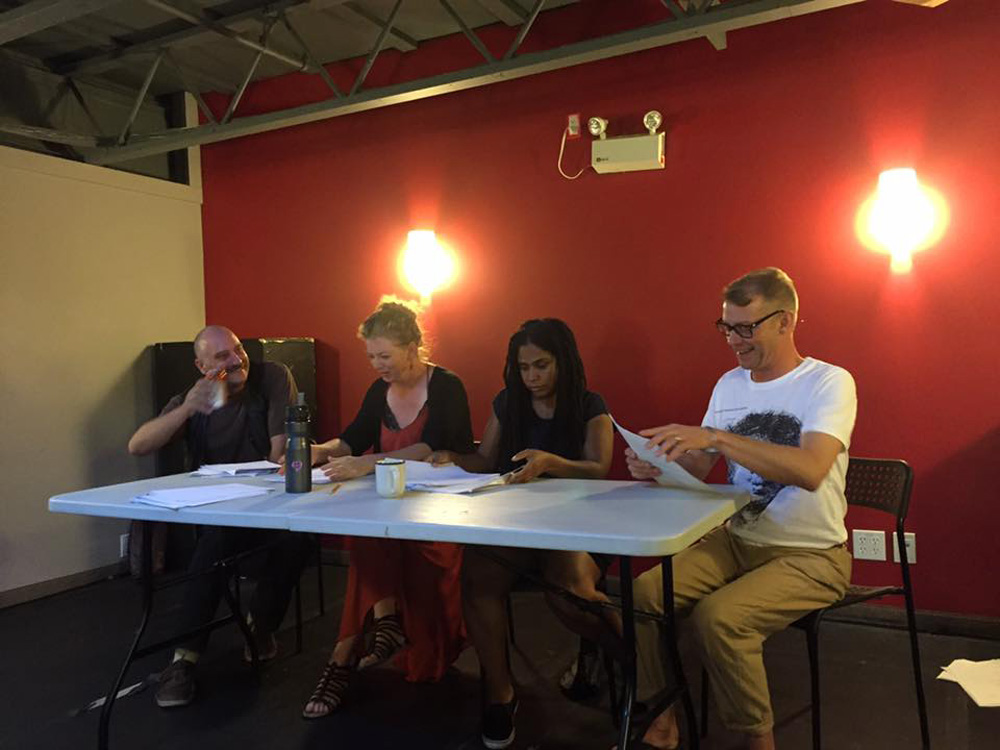
Mike Czuba, Kira Bradley, Melanie Murray Hunt, and Trevor Rueger workshopping new work with APN
JAMES
Well considering where we are right now can you talk a little bit about diversity and inclusion as an organization.
TREVOR
Three years ago, at a board retreat, one of our board members brought up as a point of discussion that we don’t seem to be doing a lot of work in the realm of diversity which lead to a really great conversation that we had never had as an organization. Because our organization has always been open, and available, to anyone and everyone.
JAMES
If you’re a playwright, call us.
TREVOR
If you’re a playwright, call us. We don’t discriminate based on age, race, country of origin, religious background, sexuality, or sexual identity. None of that has ever been a part of our membership process. And we’ve never asked those questions, nor did we ever care to. So that led us to the discovery that while that may be our internal belief that may not be our external perception.
And as we’ve done some surveys and spoken to diverse theatre creators about this what we discovered is not that the outside perception was necessarily wrong, but that the outside perception was different from our internal belief. We believed that we were an open door for everyone, but what we discovered is we have to take that door out to people and let them know that we exist and that we have this belief?
JAMES
It’s not enough to just have the door open.
TREVOR
Exactly. So, we’ve held a couple of meetings with diverse artists from across a number of disciplines both in Calgary and Edmonton. We’re also undergoing a process with the Professional Association of Canadian Theatres and there’s a number of Calgary theatre companies that have gotten together for two or three meetings to have frank and open discussions about equity, diversity, and inclusion that are chaired and convened by diverse artists which has been really eye-opening to us.
We just got some money from Calgary Arts Development, to dig into this work a little deeper. So, we’ve just hired what we’re calling a Community Outreach Ambassador, who for a period of time is going to go out and engage with diverse and underrepresented communities and just have frank and honest conversations with them about what our organization does. Here’s who we are. Do you have creators? Do you have writers? What can we offer you? Is there anything that we could provide that would assist you on your artistic journey?
By the end of this year we’ll probably be creating some value statements that we will publish on our website and those value statements around equity, diversity, and inclusion will trickle down and be at the forefront of thoughts regarding programming.

For ten years Trevor Rueger was the chair, writer, and producer of the Betty Mitchell Awards. The Betty Mitchell Awards recognize excellence in Calgary’s Professional Theatre Community. Photograph by Jasmine Han
JAMES
So, let’s talk about dramaturgy. How do you engage with the playwright? What works best?
TREVOR
For me, dramaturgy is a philosophy. And the philosophy is simply about helping the playwright find the ideas, both big and small in the world that they’re trying to create. I tend to start every dramaturgical session by asking the playwright, “Tell me about you and tell me about your work. And tell me about the creative process that you’ve been engaged in thus far and tell me what you want to say.” A lot of the questions and feedback that I tend to formulate, as I’m reading a work generally always come back to, “What are you trying to say? What do you want the play to say? What do you want the audience to think, feel, and be saying when they’re walking out of the theatre? What’s the experience you want to take them through?” So that’s always where I start a conversation. And that becomes a touchstone from which we can negotiate.
JAMES
Do you have any particular way of breaking down scripts?
TREVOR
There are three things that I really focus on. One is character. If I was to pick up this script as an actor or a director, based on what I’m seeing right now, would I be able to either give a performance, akin to what the playwright has written, or as a director get to a performance that’s akin to what the playwright has written. That’s usually where I have a lot of questions about the character and the character journey. To me, it starts with character, then it moves into structure. How is the world structured? How is your narrative structure? And then my third one is time. I think the notion of time is overlooked by emerging playwrights.
JAMES
What do you mean by time?
TREVOR
What I mean by time is how much time expires in the world of your play. Because time has a powerful effect within a narrative in terms of an emotional state. When I teach my introduction to playwriting, I use the epilogue at the end of Death of a Salesman as an example of time. Linda is standing at Willy’s grave and in the reality of the play he passed two or three days ago. She’s got this beautiful speech about, “I can’t cry Willy. I can’t cry. Every time I hear the screen door open, I expect it’s you. I can’t cry.” And I always ask playwrights in the course, “Okay, so that’s three days ago, but let’s imagine she’s standing at the grave a year later and says those exact same words.”
JAMES
It totally changes everything.
TREVOR
It totally changes everything, right? The audience now is getting a completely different story. And all you’ve done is change the element of time. The actor is going to play it differently. The director is going to approach it differently. So, that’s what I mean by the notion of time, and how time is important and sometimes we give a story too much time. It becomes too epic and the hero’s journey loses all of its stakes.
When you sit down as a playwright and you start to think about a character that’s going to inhabit your world, that’s a piece of coal. Until you put that piece of coal under pressure, you’re not going to reveal all of its facets. So, characters have to be put under pressure. And that’s where you as a writer, and your audience is going to discover all of the facets of that character. And you’re going to turn that piece of coal into a diamond. With facets that shine and shape and inform. It’s pressure. But the pressure can be lost if the writer gives it too much time.
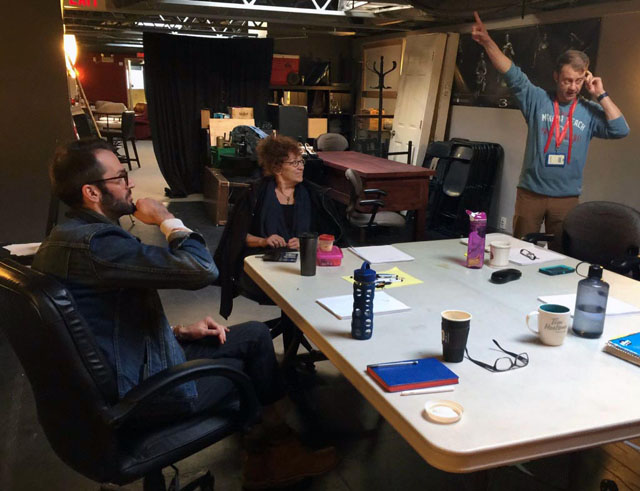
L to R: Col Cseke, Kathryn Kerbes & Trevor Rueger in an APN workshop for Saviour by Maryanne Pope – January 2019
JAMES
I really like the fact that you’re talking character, structure, and time, because then it doesn’t matter whether it’s comedy – doesn’t matter whether it’s a tragedy – because those function in every story. And those things are the elements the story is built out of.
Okay, I have one final question. Speaking as a dramaturge you’re working with a new playwright. He’s written a new play called Hamlet. What are your dramaturgical notes on Hamlet because it’s a pretty good play?
TREVOR
Yeah, it’s pretty good. One question would be, “Do you feel that the Fortinbras plot is overwritten for what thematically you think it’s giving you?” Because that’s the plot that always gets cut. And I ask people when I’m teaching my introductory playwriting course, “In Hamlet, how long from the first scene on the parapets of Elsinore castle to the end of the play? How much time has expired in the real world?”
JAMES
You know, I’ve never thought about it, but it feels like it’s a lot of time. Well because he travels to England and comes back. I don’t know. A month. Two months?
TREVOR
Six months.
JAMES
Six months.
TREVOR
Six months in order to travel by boat to and from England. And there is a reference to six or seven months actually later in the text. But if Hamlet was to be that slow and wishy-washy for seven months…
JAMES
…he wouldn’t have our sympathy. We’d be frustrated with him.
TREVOR
Yeah, we’d want to punch him in the face. So, our mind shortens it to an acceptable amount of time. Yeah, I could see how he would have difficulty making a choice in two months. But you know, if I’m really thinking about the fact that it’s taking him six to seven months to make a decision, I’m starting to turn off the character. Yeah, so maybe you want to take a look at time.
I did a speech for a seniors group at Theatre Calgary many years ago about dramaturgy and I created a fictional case study on if I was to dramaturg Hamlet, but it was like, draft one, right? So, Shakespeare comes to me and he goes, “Okay, I got this great idea for a play. Here’s what’s going to happen. Kid comes back from college because his dad’s died. And then his mom is sleeping with his uncle and his uncle killed his dad.”
“Oh, that sounds really great.”
“Yeah. And then he enacts revenge.”
“Okay, great. Question. Did he witness the murder?”
“No, he did not witness the murder.”
“Did somebody witness the murder?”
“No, no, no. This is how the uncle is getting away with it. Nobody witnessed the murder.”
“So how does Hamlet know that his uncle did it?”
“What do you mean?”
“Well, you said he exacts revenge on his uncle for the murder of his father?”
“Yeah?”
“So how does he know his uncle killed his father?”
“Ah, yeah, I see what you’re saying. (Pause) Ghost of his dad?”
“Ghost of his dad! Good idea. Let’s have him show up.”
Alberta Playwrights’ Network is a not-for-profit provincial organization of emerging and established playwrights, dramaturgs, and supporters of playwriting. Our members come from across the province in both rural and urban communities, with the largest portion of our membership residing in Calgary and Edmonton. We strive to be a truly province-wide organization, with representation from all corners of the province. Alberta Playwrights’ Network exists to nurture Albertan playwrights and provide support for the development of their plays. APN promotes the province’s playwrights and plays to the theatre community while building and fostering a network of playwrights through education, advocacy, and outreach.
DOWNLOAD – James Hutchison Interviews Trevor Rueger: Actor, Director, Dramaturge
